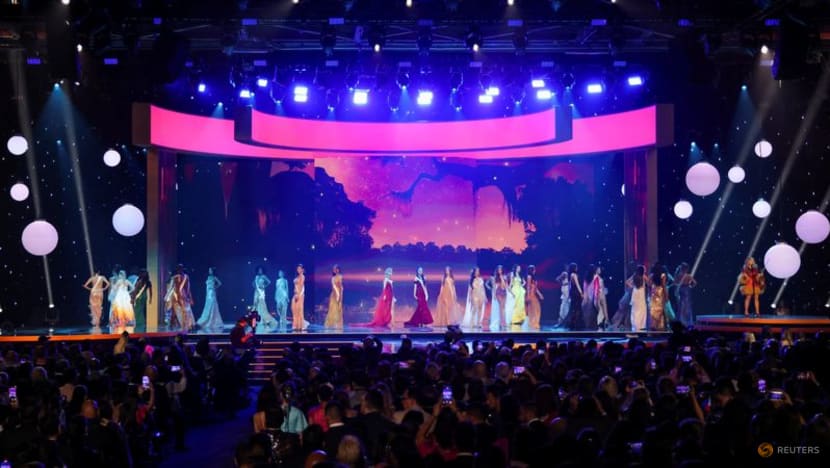Miss Universe cuts ties with Indonesian organiser as sexual harassment allegations swirl

A general view during the 71st Miss Universe pageant in New Orleans, Louisiana, on Jan 14, 2023. (File photo: Reuters/Jonathan Bachman)
JAKARTA: The Miss Universe Organization has cut its ties with its Indonesian franchisee and will cancel an upcoming pageant in Malaysia after contestants complained to police, accusing local organisers of sexual harassment.
The New York-based organisation said in a statement late on Saturday (Aug 12) that it had decided to sever ties with PT Capella Swastika Karya, and its National Director, Poppy Capella.
Six contestants in a Miss Universe Indonesia pageant recently filed complaints with police, accusing local organisers of asking them to strip to their underwear for “body checks” for scars or cellulite, in a room with about two dozen people present, including men. Five of the contestants said that they were then photographed topless.
“In light of what we have learned took place at Miss Universe Indonesia, it has become clear that this franchise has not lived up to our brand standards and ethics,” the Miss Universe Organization said on the social media site X, formerly known as Twitter.
The organisation also said that it would be cancelling this year’s Miss Universe Malaysia as the Indonesian franchisee also holds the licence for the pageant. It said it would make arrangements for the Indonesia 2023 title holder to compete in Miss Universe pageant to be held in El Salvador late this year.
The Miss Universe Indonesia pageant was held from Jul 29 to Aug 3 to choose Indonesia’s representative to the 2023 Miss Universe contest, and was won by Fabienne Nicole Groeneveld.
PT Capella Swastika Karya is an Indonesian beauty company which took over the licence for Miss Universe Indonesia in March from Yayasan Putri Indonesia or YPI, an Indonesian foundation that held the licence for 30 years.
The company’s founder, Poppy Capella, denied her involvement in the physical examination during the contest and said that she is against any kind of “violence and sexual harassment”.
“I, as the national director and as the owner of the Miss Universe Indonesia licence, was not involved at all and have never known, ordered, requested or allowed anyone who played a role and participated in the Miss Universe Indonesia 2023 process to commit violence or sexual harassment through body checking,” she posted on social media late on Saturday.
Hengki Haryadi, the Jakarta police director for general crimes, said on Sunday that during a Miss Universe Indonesia pageant held in the capital, Jakarta, from Jul 29 to Aug 3, the victims were forced to remove their clothes and were photographed naked for physical examination in a hotel ballroom.
“These victims feel forced to take off their clothes and pose inappropriately for body checking that traumatised them,” Haryadi said.
He added that police are still examining surveillance cameras from the scene. Investigators will interview the victims and provide psychological assistance, he said.
In its statement on Saturday, the Miss Universe Organization said that there are no measurements such as height, weight or body dimensions required to join a Miss Universe pageant worldwide, and thanked the Indonesian contestants “who have bravery in speaking out”.
“To the women who came forward from the Indonesian pageant, we are sorry that this was your experience with our organisation,” it said, adding that they are also evaluating their current franchise agreement and policies to prevent this type of conduct from occurring in the future worldwide.
Controversy over the pageant has been mounting in Indonesia, the world’s most populous Muslim-majority nation, which has a reputation as a tolerant, pluralist society that respects freedom of expression. Most Muslims in Indonesia, a secular country of 277 million people, are moderate, but a small hardline fringe has become more vocal in recent years.
In 2013, several conservative Muslim groups staged a massive protest against the Miss World competition in Indonesia, prompting the movement of the contest from Jakarta to the resort island of Bali. All of the more than 130 contestants were required to wear Bali’s traditional long sarongs instead of the sexy bikinis that are historically part of the competition.













